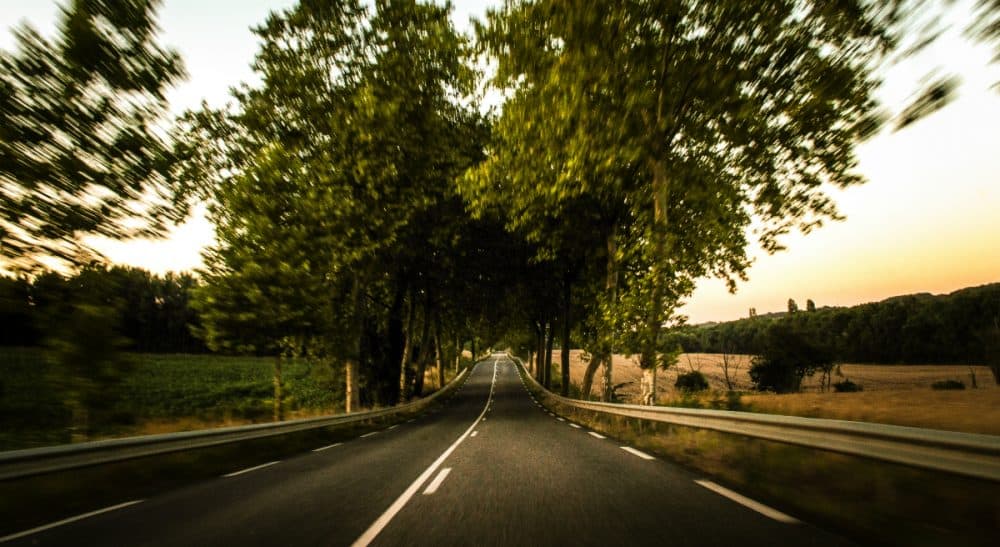Advertisement
The Closing Of America’s Open Road

That free mobile app that so conveniently reroutes us around traffic comes with a hidden price. It’s a price that will take years for us to appreciate. But the next time you find yourself on some obscure back road, rerouted by an algorithm, take note of all of those cars suddenly ahead and behind you. And let out a low, bovine moo.
The algorithm is herding us.
The car, a century-old technology, is fast becoming the ultimate consumer electronic of the digital age — indeed the leading edge of the industrial Internet.
This rise in vehicle connectivity — and parallel transportation trends — will ultimately produce major changes in the country’s self-image and collective psyche.
From Walt Whitman’s “Song of the Open Road” to Jack Kerouac’s “On the Road” to Hollywood’s sprawling sub-genre of “road culture” films, the possibility of freedom -- unfettered, wanderlust-fueled looking for America -- has endured. The great blues singers mythologized the road. The ramblin’ bards, from Woody Guthrie to Bob Dylan, crooned their odes. Bruce Springsteen drove us down his “Thunder Road.”
This rise in vehicle connectivity -- and parallel transportation trends -- will ultimately produce major changes in the country’s self-image and collective psyche.
We could vanish over the plains, slip into the countryside. Even the drive-time commute promised a bit of peace, a temporary withdrawal from the social-digital grid. Prior technological changes merely fueled the dream. The car radio, that great stimulator of imagined ballgames, euphoric sing-alongs and NPR moments (and lots of “Car Talk”), served as yet another passenger on our open-road journeys.
But the blur of news touting driverless, shared and connected vehicles heralds something altogether different — the end of an era, perhaps.
Mechanics of change
All of the automakers now seem to be making plans for the “intelligent car.” Transportation insiders imagine a moving “mesh network” of vehicles, Internet connections jumping around the swarm of four-wheeled routers.
At the same time, the sharing economy and the likes of Uber may mean the very idea of car ownership will become a thing of the past. Younger Americans are getting driver’s licenses at lower rates. And with a migration toward cities, bikes and public transportation, the car could become an increasingly rare species.
Years from now, it’s possible we may have to go to special tracks to drive cars, just as riding horses was finally confined to farms and ranches.
Talk in the transportation futurist world revolves around two trends: mobility-as-service, or taking a mode-agnostic, Uber-like approach to all forms of transportation; and the connected car, or the pumping in, and collection, of streaming data from vehicles.
On the plus side, this can mean improved safety, as vehicles communicate their positions to one another in automated fashion. The transit-tolling-parking process may become seamless, resulting in diminished congestion and better air quality.
It is true, too, that tracking capabilities and increased connection can produce other social goods.
When the Tsarnaev brothers carjacked a Mercedes-Benz SUV, authorities got access to the onboard tracking system. After the recent murder of two journalists on live television in Virginia, authorities reportedly were helped by a police car license plate scanner that pinpointed the shooter’s vehicle. Former Massachusetts Lt. Gov. Tim Murray’s tale about his infamous car crash was upended when the car’s event data recorder (EDR) revealed contradictory information.
The Tao of telematics
Yet this technology, called “telematics,” has also gotten the attention of lawmakers, who have proposed protecting consumers with legislation like the SPY Car Act of 2015.
Insurance companies have begun trying out usage-based policies, where in exchange for allowing tracking, you might earn a lower premium. And so-called “starter interrupt” devices, which allow auto loan lenders to turn off an engine if delinquent borrowers fail to pay again, have been installed in millions of vehicles.
Then there’s the security problem of having a large moving device connected to the Internet. Could someone shut off all of the Fords on the roads with the click of a mouse?
“There’s this tradeoff, particularly if the data are linked to an individual,” says Susan Shaheen of the University of California, Berkeley, where she co-directs the Transportation Sustainability Research Center.
In a recent interview, she told me that there are two “polarized” schools of thought in transportation circles: the Orwellians, who believe connected cars are “incredibly invasive of privacy”; and the optimists, who are cheerleading the way toward a fully connected car.
Government Accountability Office investigators found that of 10 auto industry-related companies they studied, nine “share[d] location data with third-party companies, such as traffic information providers, to provide services to consumers.”
We are all big data now
All of the data exhaust produced has substantial implications for transportation systems as a whole.
One example is the partnership Boston’s city planners have struck with the driving mobile app Waze, owned by Google. The company’s platform crowdsources user reports about traffic problems (it has about 400,000 users in Greater Boston).
Years from now, it’s possible we may have to go to special tracks to drive cars, just as riding horses was finally confined to farms and ranches.
Matt Mayrl, the city’s deputy CIO, told me recently that the Waze partnership is a “great example” of the promises of big data. “In many cases,” he says, the city “doesn’t have the best kind of data.” The Waze data enables a more quantitative management approach to traffic signals and flow. City planners of the future will “able to assemble a broader picture of the quality of life,” Mayrl notes.
Waze streams anonymized data to the city’s analytics team. But there may come a day, says Shaheen of UC-Berkeley, where people want to opt-in to give over personalized data. After all, we do it all the time with the likes of Google and Facebook, in exchange for a personalized experience.
The frontier closes — again?
In the 19th century, the American historian Frederick Jackson Turner advanced his controversial “frontier thesis,” asserting that the process shaping the country’s distinctively individualistic values through westward expansion had ended.
The 1890 Census had found that there was no more truly uninhabited territory. The frontier, and with it a certain American mindset, had closed.
Fifteen years after Turner’s articulation of this new American reality, Ford’s Model T rolled off an assembly line, inaugurating a new form of personal mobility that would fuel America’s wild romance with the road.
That long second chapter in American history may now be closing, too.
